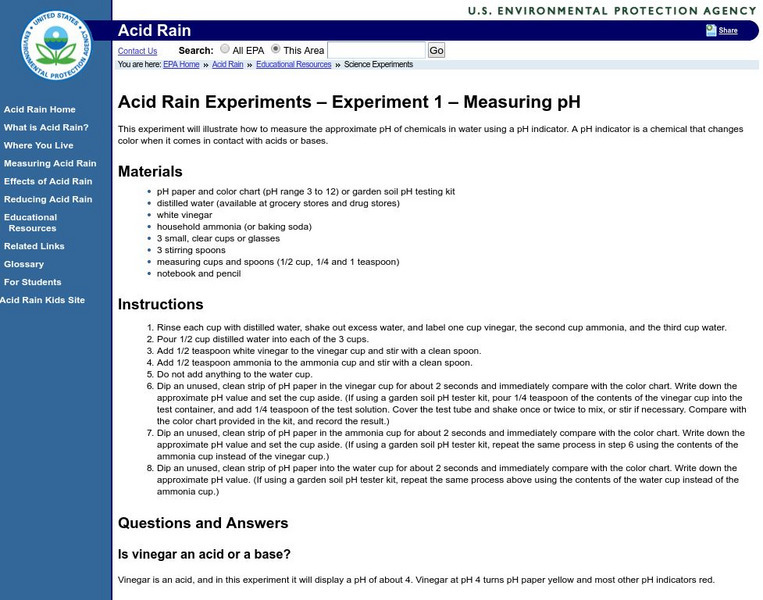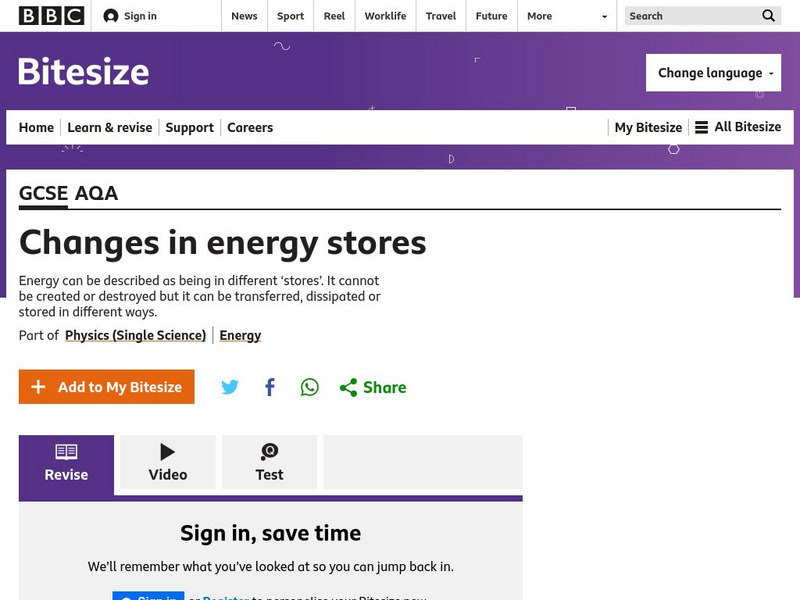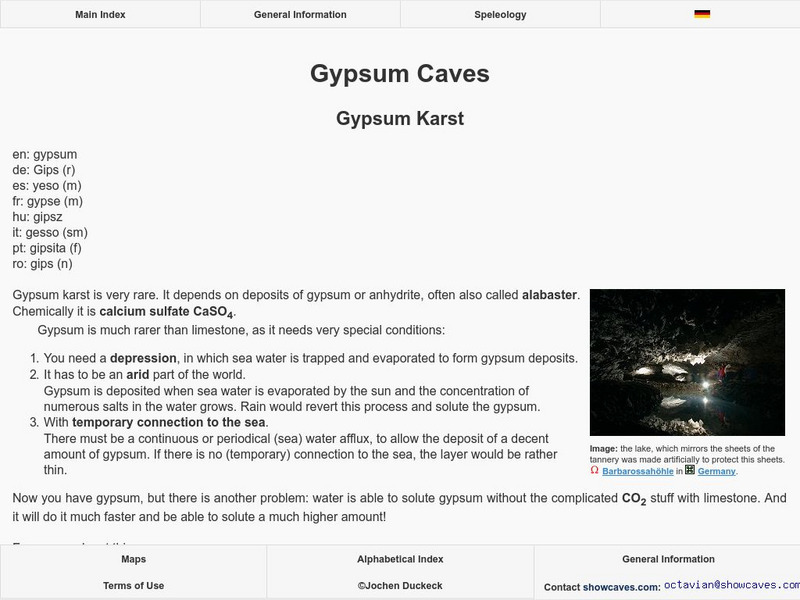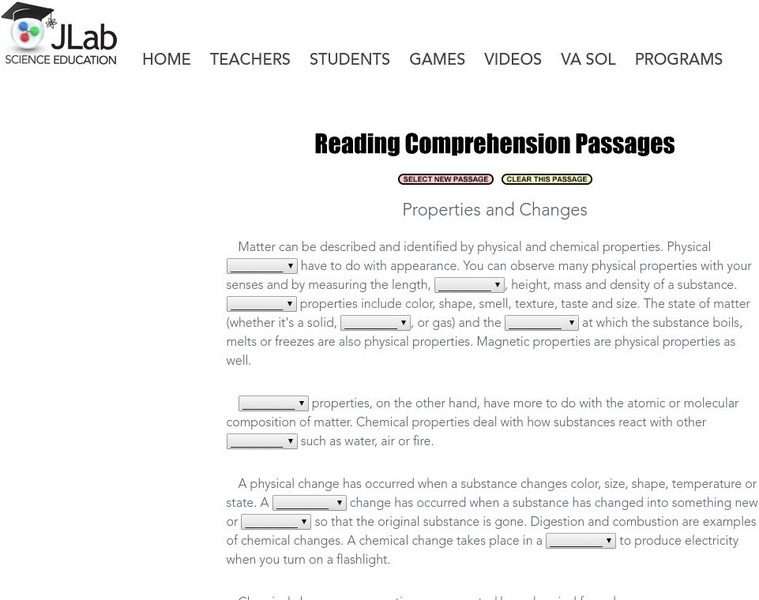US Environmental Protection Agency
Epa: Making a Natural P H Indicator
At this site you will find a step by step process for making a natural pH indicator. One of the main materials you need to have on hand is a red cabbage.
US Environmental Protection Agency
Epa: Measuring P H Experiment
This is an activity that deals with acid rain. "This experiment will illustrate how to measure the approximate pH of chemicals in water using a pH indicator." It is easy to follow the comprehensive set of directions.
Other
Exxon Mobile: Be an Engineer
Where can an engineering degree take students? Read the stories of innovative thinkers and engineers.
Other
University of Rhode Island: Graduate School of Oceanography
Resource presents information about the school of oceanography and the courses offered and research being done there.
BBC
Bbc: Gcse Bitesize: Changes in Energy Stores
Energy can be described as being in different "stores". It cannot be created or destroyed but it can be transferred, dissipated or stored in different ways. There are seven main stores of energy: magnetic, internal (thermal), chemical,...
Science Struck
Science Struck: The 13 Types of Energy and Their Applications
Read about all the different kinds of potential and kinetic energy. Includes energy formulas and examples of energy applications.
Other
Speleology: Gypsum Caves
An explanation of how Gypsum Caves form and where they are located. A picture of the Bararossahohle cave in Germany.
Better Lesson
Better Lesson: Reaction Rates Flipped (Day 1)
Eighth graders will briefly review key information about reaction rates before designing their own experiments to complete a chemical reaction within a student specified amount of time.
CK-12 Foundation
Ck 12: Energy and Its Forms
[Free Registration/Login may be required to access all resource tools.] Students explore the different forms of energy and investigate how the law of conservation of energy plays an important part of those forms.
Khan Academy
Khan Academy: Animal Communication
Learn how animals communicate with visual, sound, touch, and chemical signals.
CK-12 Foundation
Ck 12: Life Science: 12.25 Indoor Air Pollution
Learn about some of the main sources of indoor air pollution.
Science and Mathematics Initiative for Learning Enhancement (SMILE)
Smile: Somethin' Sweet
This site provides a lesson plan using candy making to demonstrate physical and chemical changes in matter. Includes directions to make caramel and rock candy.
Thomas Jefferson National Accelerator Facility
Jefferson Lab: Reading Passage: Properties and Changes
Read and fill in the blanks of this passage properties and changes. Each blank has a dropdown menu with choices. When you finish, click CHECK MY ANSWERS. If you pick a wrong answer, the right answer will be displayed along with your choice.
Clackamas Community College
Clackamas Community College: Chemical Groups
This site, which is provided for by the Clackamas Community College, gives a basic explanation of Chemical Grouping, including the Boron group.
ClassFlow
Class Flow: Periodic Table: Metals and Nonmetals
[Free Registration/Login Required] This flipchart defines metals and nonmetals and explores the periodic table of the elements.
ClassFlow
Class Flow: Acid Base Titration
[Free Registration/Login Required] Determination of the Molarity of an Acid or Base Solution.
ClassFlow
Class Flow: Balancing Chemical Equations
[Free Registration/Login Required] In this flipchart students will use the Activotes and pen to balance chemical equations.
ClassFlow
Class Flow: Chemical Reaction Classification
[Free Registration/Login Required] This is a basic flipchart for classification of simple chemical reactions. It includes sounds for feedback and use of Activotes for student self-assessment.
ClassFlow
Class Flow: Ionic Bonding & Ionic Compounds
[Free Registration/Login Required] Ionic Bonding & Ionic Compounds - Objective - compare and contrast chemical formulas for ionic & molecular compounds.
Ducksters
Ducksters: Chemistry for Kids: Famous Chemists
Get some information about some famous chemists who made impacts on their fields! These scientists helped to develop the laws of chemistry and discovered many of the elements.
Ducksters
Ducksters: Chemistry for Kids: Chemical Mixtures
Explore all about chemical mixtures on this site including solutions, alloys, suspensions, colloids, dissolving, examples, and facts.
Ducksters
Ducksters: Chemistry for Kids: Glossary and Terms
Kids learn about important glossary and terms used in the science of chemistry. Words and definitions you need to know from acids to valence electrons.
Ducksters
Ducksters: Chemistry for Kids: Chemistry Lab Equipment
Kids learn about the lab equipment used for chemistry experiments such as beakers, flasks, test tubes, stirring rods, pipettes, bunsen burners, gloves, goggles, and more.



















